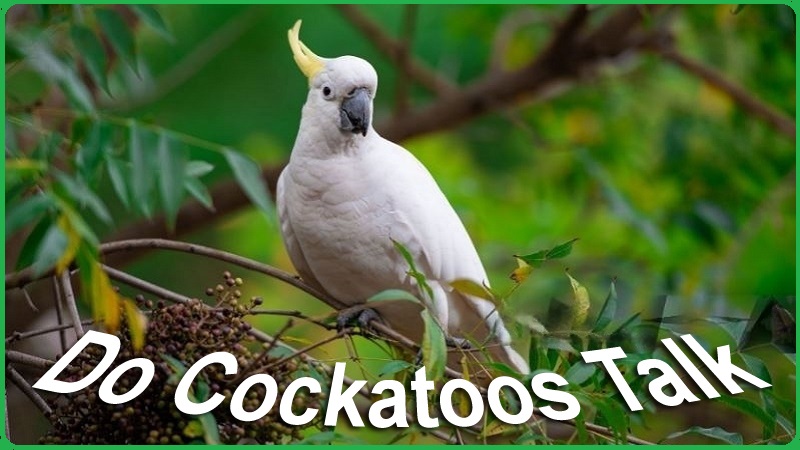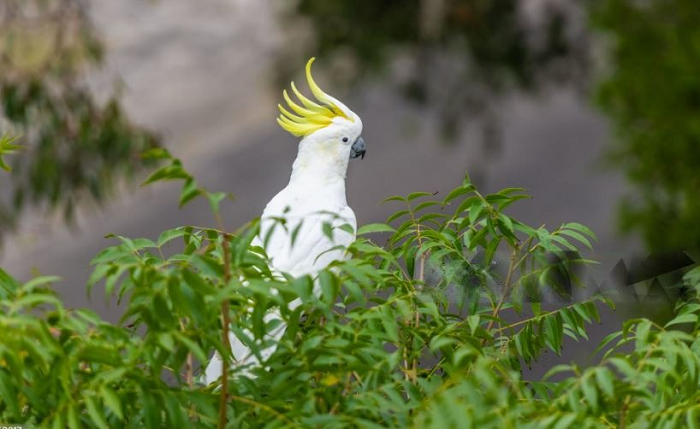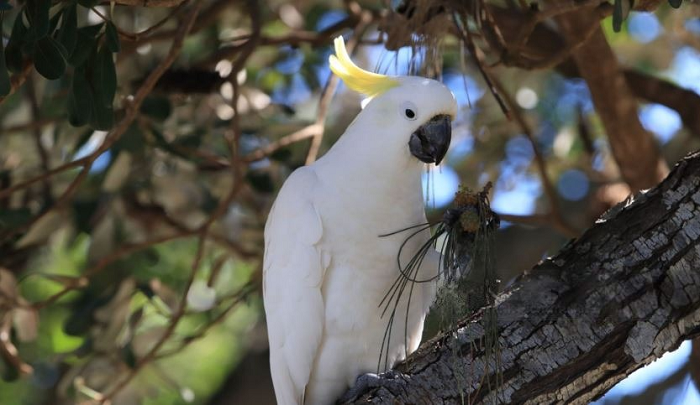Before going to ahead, you should know about cockatoos are not good talker’s birds. But, they have more capability to mimic human speech. They can copy some sound, which they hear around them-self like as microwave beeps, doorbells, and more. Now, you are thinking about ‘do cockatoos talk properly or not.’ Don’t worry! Here, you will get all answers of your arising questions in your mind.
Mimicry skills are also depended on the cockatoo species, the age at which they begin learning, bonding, happiness, and personality. Few cockatoo’s birds can learn up to 30 words, while others never talk.
However, cockatoos have abilities certainly to speak. When cockatoos learn to talk, they get relatively quiet soft and high pitched. Through this article, we will cover insights into the vocal world of cockatoo parrots; and other important stuffs regarding cockatoo talking.
How Do Cockatoos Communicate?
Cockatoos can make communication through a combination of body language and their vocalizations. Their loud screeching works as a defense mechanism to get panic away predators. Additionally, they also use shorter calls for communication. They are capable to change the shape of their yellow crest and body postures to convey messages like alarm.
In terms of body language, cockatoo can fluff up its feathers, and also stand on one foot when calm or resting. They can also cover part of its bill with feathers that indicating a state of calmness. Cockatoo displays own excitement by erecting crest feathers and being very active.
Spreading wings and making noise also involve in their behaviors. When cockatoos feel scare, they puff up their feathers and face the threat with aggression. In the fear condition, they may pull their feathers close to the body and standing erect.

Aggression is indicated by direct eye contact, walking towards a person, and biting; while signs of heightened arousal include eye pinning and whole-body bobbing. Cockatoos can also communicate to express romantic interest with specific behaviors such as beak clacking, regurgitation, and head bobbing.
Why Do Cockatoos Talk?
In real, Cockatoos don’t like to talk, but rather they can mimic human speech and other sounds. They are well known for their imitate capability of the large range of vocalizations such as words, phrases, whistles, and even laughter.
Also Read: Can Macaws Talk? Exploring Macaw Vocalizations
Through vocal learning process, cockatoos can learn to mimic, in which involves imitating sounds they hear from their environment, especially from their owners. The more a cockatoo get expose to and interacts with humans, the more probability it is to grab on and repeat various sounds and words.
Can Cockatoos Understand Us?
Cockatoos have limited ability to understand human body language to some extent, but their comprehension is not as accurate as in their own communication system.
However, they are capable to learn to read human body language and cues, but may not fully grasp the nuances of human communication like a native speaker.
Cockatoos can also learn to mimic human speech and sounds, but they are unable to understand of the meaning behind these vocalizations.
In essence, cockatoos can pick up on specific human behaviors and sounds, but their understanding is more basic. So, they focus on mimicry instead of true comprehension of human language.
What Are Vocal Abilities of Cockatoos?
Cockatoos’ vocal abilities are depended on the combination of innate calls and learned mimicry that reflecting their intelligence and social nature.
Also Read: Can Parrotlets Talk? Myth or Reality
Mimicry
Human Speech: Cockatoos are adept at mimicking human speech, often learning to repeat words and phrases they hear frequently.
Environmental Sounds: They can imitate various sounds from their environment, such as doorbells, phone rings, and other bird calls.
Natural Vocalizations
Calls and Screeches: They generate loud calls and screeches for long-distance communication. These are often to keep maintaining contact with flock members or warn of danger.
Soft Chatter and Coos: Used in close interactions, these sounds convey affection, reassurance, and bonding between mates and their young.
Communication Purposes
Social Interaction: Vocalizations help establish and maintain social bonds within the flock or with human caregivers.
Expression of Needs and Emotions: If, cockatoos produce their vocal range, that means they are hunger, excitement, distress, and other emotions.
Learning and Adaptation
Training: With positive reinforcement, they can learn to associate specific sounds with actions or rewards.
Contextual Use: Cockatoos often use learned sounds in appropriate contexts, enhancing their interaction with humans.
At What Age Do Cockatoos Start Talking?
The exact age can vary depending on the individual bird, and its environment. Several factors influence when a cockatoo begins talking:
Typical Age Range: Generally, cockatoos start talking between 6 months and 1 year.
Species Variability: Different species can begin talking at slightly different ages.
Social Interaction: Get frequent interaction with humans, then it can encourage speech development.
Training and Reinforcement: Provide consistent training and positive reinforcement, such as treats and praise; it can accelerate the talking process.
Individual Personality: Each bird has own unique personality. So, some cockatoos may start talking earlier or later.
Encouragement Tips
- Spend regular quality time talking to your cockatoo
- Repeat specific words and phrases often
- Reward attempts at speech with treats and attention
What Sounds Can Cockatoos Mimic?
Cockatoos are renowned for their ability to mimic a variety of sounds. Here, we will show you different kinds of sounds they can mimic:
Also Read: Do Cockatiels Talk? A Guide to Their Vocal Talents
Human Speech
Words and Phrases: Cockatoos are able to learn for replicating individual words, and short phrases they frequently hear. For example, hello, good morning, and I love you
Voice Intonation: They are not just capable to mimic the words, but also the intonation and pitch of the human voice. Their speech sound quite similar to the original speaker.
Household Appliances
Microwave Beeps: Cockatoos often mimic the distinct beeping sound of a microwave, when it finishes cooking.
Phone Rings and Alerts: They can accurately reproduce various ringtones and notification sounds from smartphones.
Doorbells: The sound of a doorbell is commonly mimicked. Sometimes causing confusion when someone thinks there’s a visitor at the door.
Animal Sounds
Dogs Barking: Cockatoos can mimic the barking of dogs, sometimes even the specific bark of a household pet.
Cats Meowing: They are also capable to imitate the meowing of cats. They are also capable of imitating the meowing of cats. It is often startling both the actual cats and their owners.
Other Birds: Cockatoos can replicate the calls of other bird species, which they might hear in their environment or on TV.
Musical Instruments
Piano Notes: They can mimic the sound of piano notes, especially if they hear music being played frequently.
Whistling: Many cockatoos are adept at mimicking whistling tunes or melodies they hear from their owners.
Guitar Strums: They can also replicate the sound of guitar strumming, capturing the essence of the instrument’s tonal qualities.
Environmental Noises
Alarm Clocks: Cockatoos can mimic the beeping sound of an alarm clock that can often confusion in the morning.
Traffic Sounds: They can reproduce sounds such as car horns, sirens, and the general hum of traffic, especially if they live in urban areas.
Coughing and Sneezing: Cockatoos often mimic human sounds like coughing or sneezing that can be both amusing and surprising.
How Do You Teach a Cockatoo to Talk?
When you teach a cockatoo to talk, then involves patience, repetition, and positive reinforcement. Here’s a step-by-step guide to help you train your cockatoo:
Also Read: Where Do Parrots Live? Exploring Their Diverse Habitats
Choose Short Word: Starting with a simple word like “Hi” or “Hello” to focus on initially
Repeat the Word Daily: Always consistently say the selected word to your bird every day
Associate Meaning: Show the meaning of the word by using it in relevant situations
Reward Attempts: Encourage mimicking by rewarding any attempts with treats or attention
Repeat Clearly: When your bird mimics the word, repeat it back clearly for practice
Respond to Mimicry: Always respond when your bird says the word to reinforce learning
Progress to Phrases: Once your bird masters the first word, move on to teaching short phrases like “Pretty Bird” or “Thank You“.
Best Talking Cockatoos
There are many species of cockatoos are known for their exceptional talking abilities. Here are some of the best talking cockatoos:
Yellow-Crested Cockatoo
- Talking Ability: Excellent mimic, large vocabulary, clear speech
Rose-Breasted Cockatoo
- Talking Ability: Good talkers, capable of learning a variety of words and phrases
Umbrella Cockatoo
- Talking Ability: Very social, excellent talkers with consistent interaction
Moluccan Cockatoo
- Talking Ability: Good talkers, expressive, enjoy interaction with humans
Goffin’s Cockatoo
- Talking Ability: Can learn to mimic words and phrases with clarity, though vocabulary may be smaller than other species
Challenges and Considerations
You may face some challenges and considerations in teaching a cockatoo to talk, include
Also Read: A Closer Look at African Grey Bite and its Causes, Prevention, & Training
Time and Patience
- Require consistent effort over months or even years to teach a cockatoo to talk
- Regular daily interaction is essential for progress that can be time-consuming
Individual Variation
- Not all cockatoos are able to learn to talk at the same pace; some may never talk despite training
- Each bird has a unique personality that affecting its willingness and ability to mimic sounds
Behavioral Challenges
- Cockatoos always use their vocal abilities to seek attention. So, it can lead to excessive noise if not managed properly.
- You should provide sufficient mental stimulation; otherwise cockatoos can become bored or stressed. They can manifest in undesirable behaviors such as screaming or feather plucking.
Health and Well-Being
- A balanced diet is essential for a cockatoo’s overall health and cognitive function
- You have to need regular check-ups with an avian vet to ensure the bird’s health. Otherwise, it can impact its ability to learn and mimic sounds.
Environmental Factors
- Training should occur in a quiet environment free from distractions to help the bird focus.
- Exposure to a variety of sounds can help in learning, but too much noise can overwhelm the bird.
Consistency and Reinforcement
- It is essential to use of treats as consistently, and praise to reinforce desired behavior.
- Establishing a consistent training routine helps the bird understand what is expecting
Communication and Bonding
- Strong bond and trust in between the bird and owner to enhance the learning process
- Owners need to understand their bird’s body language, and cues to communicate effectively
Ethical Considerations
- While teaching a cockatoo to talk, it’s important to respect its natural behaviors and not push it beyond its comfort zone.
- Negative reinforcement or punishment can harm the bird’s trust and willingness to learn
FAQs (Frequently Asked Questions)
What if My Cockatoo Doesn’t Talk?
Not all cockatoos will talk, and some may have limited talking abilities. So, you should respect the individual bird’s capabilities, and focus on other forms of communication and bonding.
How Many Words Can A Cockatoo Say?
Most of cockatoos can learn around 20-30 words, and simple phrases with consistent training, though their speech may not be as clear as other parrot species.
Which Cockatoos’ Breed is More Talkative?
As per our expert, the Galahs (Rose-Breasted Cockatoos) are known to be better talkers than other cockatoo species. They are considered good imitators, and can mimic natural sounds like barking dogs, laughing people, or chicken sounds quite accurately.
Do Cockatoos Talk to Human?
Cockatoos can mimic human speech and sounds, but they do not truly understand human language.
Can All Cockatoos Talk?
You should be known that all cockatoos are unable to talk. While some may learn up to 30 words, others may never talk. The ability to mimic sounds and words varies among cockatoo species, with some being better talkers than others. Training, interaction, and individual differences play a significant role in a cockatoo’s talking capabilities.
Verdicts Up
It is naturally god gifted quality of any bird as talking. From this post, we have been illustrated properly that which breed of Cockatoos is good talkers and quieter birds.
So, now we hope that you obtained all your answers about ‘Do Cockatoos Talk or Not’; and how to provide good training to talk properly.
Also Read: Why Do Parrots Shake Their Heads? Causes and Insights
If this article is valuable for you, then please share it along with your friends, family members, pet lovers or relatives over social media platforms like as Facebook, Instagram, Linked In, Twitter, and more.
Do you have any experience, tips, tricks, or query regarding on this? You can drop a comment!
Have a Nice Day!!







